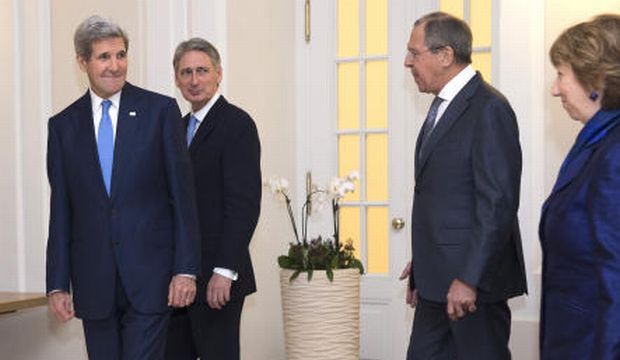
US Secretary of State John Kerry, Britain’s Foreign Secretary Philip Hammond, Russian Foreign Minister Sergei Lavrov and former EU foreign policy chief Catherine Ashton, from left, on their way to a meeting during nuclear talks on Iran, in Vienna, Austria, on Monday, November 24, 2014. (AP Photo)
Vienna and London, Asharq Al-Awsat—An extension to the talks on Iran’s nuclear program now looks likely, a number of diplomatic sources have said, as Monday evening’s deadline for a comprehensive deal draws nearer.
An Iranian official source told French news agency AFP on Sunday that Tehran was looking to extend the negotiations for six months to a year.
Meanwhile, official Western sources told Asharq Al-Awsat the US and its allies were pushing for an extension of “a few weeks” only. Those sources said sticking points on a number of “technical issues” until Sunday evening were making it difficult to reach an agreement by the proposed deadline.
When asked about the prospect of an extension to the talks during an interview with news channel ABC, broadcast on Sunday morning, US President Barack Obama did not rule out an extension to the talks.
“I think that what we’re going to do is take a look at what emerges over the course of the weekend,” he said.
Negotiators from Iran and the five permanent members of the UN Security Council and Germany—known as the P5+1—have been meeting in Vienna over the past week in a last-ditch bid to resolve the dispute over Iran’s nuclear activities.
US Secretary of State John Kerry flew in to Vienna last Thursday, and has since met several times with Iranian Foreign Minister Mohammad Javad Zarif.
The US has taken care during the last days of the talks to keep its allies in the region, particularly Saudi Arabia, up to date on the negotiations. According to the Associated Press, Kerry met with Saudi Foreign Minister Saud Al-Faisal on Sunday following the day’s talks on board the latter’s plane, which was parked at Vienna Airport.
A US diplomatic source, who requested anonymity because he was not authorized to brief the media, told Asharq Al-Awsat such meetings would likely be repeated due to the US’s desire to keep its regional allies’ interests and concerns in mind during the negotiations.
Meanwhile, Iranian state news agency ISNA reported that while a comprehensive agreement on the nuclear program was unlikely before Monday’s deadline, a broader political agreement was still on the table.
This agreement would pave the way for a more comprehensive deal if negotiations are extended as is widely expected.
Speaking to Asharq Al-Awsat regarding the likelihood of a last-minute deal, Reza Marashi, from the National Iranian American Council, said the prospect of a “breakthrough” between both sides at the eleventh hour would not be unheard of within the context of sensitive high-level negotiations such as these, though he added this would require flexibility from both sides on the issues that have proven intractable thus far.
One of the main sticking points in the negotiations revolves around guarantees that Tehran’s nuclear program is, as it contends, entirely peaceful. The P5+1 are pushing for a reduction in Iran’s uranium enrichment capacity, which they fear could be utilized to produce nuclear weapons. Tehran, meanwhile, insists on maintaining an extensive infrastructure of centrifuges.
After 12 years of rising tensions in the region and crippling economic sanctions on the Islamic Republic as a result of its nuclear ambitions, a deal is seen as crucial in maintaining stability in the region, currently already beset with the rising threat of extremist groups and the fallout from the Syrian conflict.
